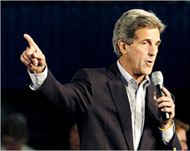Plan to overhaul CIA unveiled
The chairman of the Senate Intelligence Committee has unveiled an ambitious plan to overhaul US intelligence services.

“It’s called the 9/11 National Security Protection Act,” said Republican Senator Pat Roberts on Sunday, announcing his bill on the CBS programme Face the Nation.
As outlined by Roberts’ committee, some intelligence functions would be removed from the Defence Department and put under the authority of the new intelligence overseer.
And in contrast to the proposals put forward recently by the White House, the national intelligence director, or NID, would have budget authority over US intelligence, power to hire and fire staff and the ability to transfer funds between programmes whenever and wherever needed, among other powers.
According to the proposal, the NID also would oversee intelligence units at the National Security Agency, the Departments of Treasury, Energy, Homeland Security, the State Department, and the remaining analytical elements of the Defence Intelligence Agency.
“We do give a lot of authority to the national intelligence director,” Roberts said.
Slamming Bush
Although some Democrats were unimpressed with the bill, US Democratic candidate John Kerry’s presidential campaign on Sunday issued a statement generally favourable towards Roberts’ plan.
“I find it ironic that leaders in the Republican party are talking about making dramatic reforms in our nation’s intelligence community, yet President [George] Bush still appears to be dragging his feet and resisting any real changes,” read the statement by Kerry’s national security adviser Rand Beers.
“Senator Roberts’ proposal is welcome and is very similar to the reforms offered by John Kerry, but needs to become bipartisan to be fully successful,” said Beers who called on Bush to show “real leadership” and embrace thorough reforms.
Roberts said his draft bill was a response to two recent critical reports over the past several weeks – by the Senate Intelligence Committee and the bipartisan 9/11 Commission – damning the organisation and methods employed by US intelligence around the world.
Real reform
 |
|
Presidential candidate John Kerry |
The Intelligence Committee chairman added, however, that drafting the broad outlines of the position was still a work in progress.
“It’s not a tablet written in stone. If anybody wants to make changes or if anybody that wants to lob a brickbat or two … we’re perfectly ready,” he said.
Roberts said he planned to formally brief officials from the Bush administration on the proposal and was also seeking feedback from members of the 9/11 Commission.
“We’ve already talked to several and their reaction has been
positive,” he said.
Democrats’ reaction
Some Democrats balked, however, saying that the plan had not been shared with them and accusing Republicans of politicising an important issue that they said ought to be held above partisan wrangling.
|
“I find it ironic that leaders in the Republican party are talking about making dramatic reforms in our nation’s intelligence community, yet President Bush still appears to be dragging his feet and resisting any real changes” Rand Beers, |
“The eight people who have signed on to this proposal … are the Republicans members of the intelligence committee,” Democratic Senator Carl Levin told CBS, adding that Democrats had not been allowed to see the document.
“I think it would be better to start on a bipartisan basis with a bipartisan bill … to put the 9/11 recommendations into bill
form, and that we then start with that.”
“What we have seen is the politicisation of intelligence during
this administration. We’ve seen a director whose intelligence has been shaped to support administration policy,” said Levin, a member of the intelligence committee, and the top Democrat on the Senate Armed Services Committee.
“In any bold move, if we’re going to give more power to the intelligence director, we’ve got to take steps to make sure that that director is just not a yes man for any administration. And that’s just as important as any of the structural reform,” said Levin.